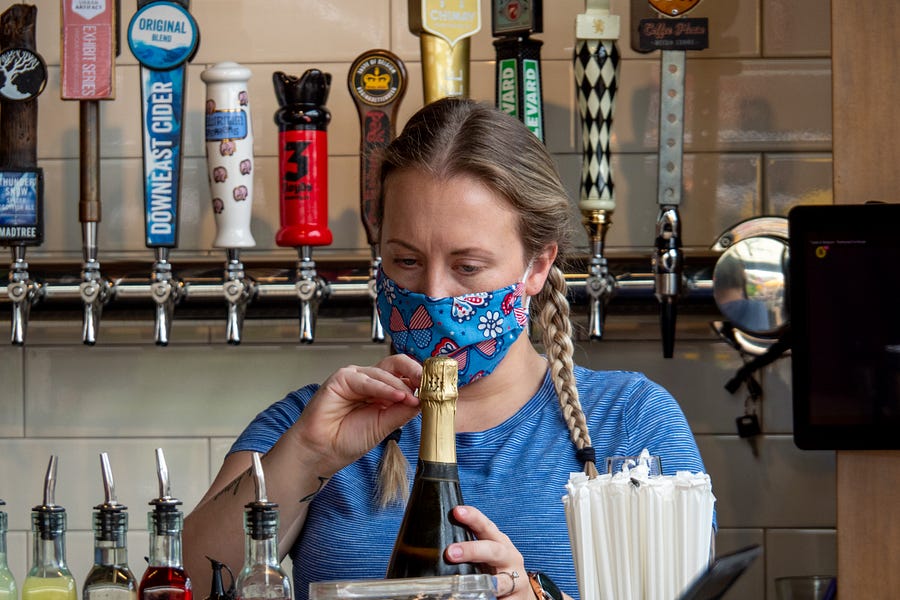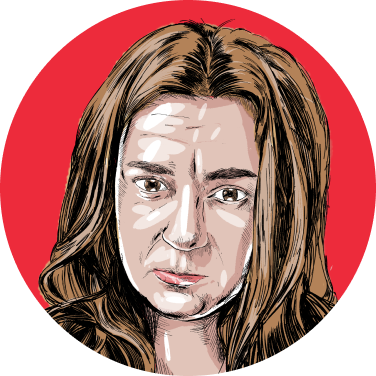It was a pretty big week for The Dispatch’s Ohio bureau, which is located in a suburb of Cincinnati. On Thursday, Gov. Mike DeWine announced that swimming pools and gyms could open and that non-contact youth sports could resume later this month. And on Friday night, I got to celebrate that good news by walking into our local brewery with my husband, ordering a beer, and sitting down (outside, of course!) to drink it.
It’s nice to have nightlife back, and I’m hopeful that my gym can find a way to reopen safely (insert “quarantine belly” joke here). But the other announcements meant a lot more to me. Our kids are swimmers and baseball players. Right before broader lockdowns started, the age-group state championship meet got canceled at the last minute, and our middle son played precisely one scrimmage before baseball was scuttled.
When life was “normal,” we often questioned whether they were overscheduled, whether we were wasting our time driving to practice and games and meets, whether the benefits outweighed the cost of more quality family time, etc. But after two months with nothing, I can tell they will benefit from having these activities back.
You didn’t come here to read about my kids, and I won’t go on too long lest your eyes glaze over like mine do when our youngest launches into a 20-minute monologue about Fortnite. But I bring it up because I think we’re going to be dealing with the implications of this pandemic on kids and their mental health for years to come. And it worries me.
It’s great that we have the technology for them to do their schooling online so they don’t lose entire academic years. But it’s also far from ideal to have harried parents trying to review assignments and stay on top of turning things in, much less trying to actually teach. As George W. Bush once famously asked, “Is our children learning?”
And that technology comes in handy so they can stay in touch with friends by texting or playing video games or having Zoom gatherings. But it’s not the same as hanging out with friends in person, playing games or having slumber parties.
My kids are, by any standard, pretty privileged. They’ve got a nice roof over their heads, we’ve not had any financial setbacks, and we live in an area that hasn’t been hit too hard by coronavirus, so they don’t even know anyone who’s been affected. And you can still see a toll: They fight more, their tempers are shorter, they sometimes have trouble sleeping. What is it like for kids in less secure situations? Kids whose parents are on the front lines and putting themselves at risk?
It would be nice if we could be doing our local and statewide reopenings with more confidence, if testing and tracing measures were farther along in development. But when we weigh the benefits and risks, I think it’s important to consider the high costs of keeping kids away from their normal routines. And I promise not to complain about driving to practice all summer.
Now, on to the best of our stuff from the week.
Someday our grandkids will ask us what we did during the pandemic of 2020. For Ben Daxon, an anesthesiologist in the ICU at Mayo Clinic, “I ordered a lot of takeout to keep the local restaurants in business,” wasn’t good enough. He took a leave from his job so that he could spend a week in late April treating coronavirus patients in a New York City hospital. His diary is at turns harrowing and uplifting. “I’m actually not sure most of my patients will make it,” he writes “It was all rather grim and brutal and I walked around last night with the same sense of futility that I noticed in others when I first arrived. At one point I imagined what it must have been like for officers in World War I shouting ‘charge’ to troops who they knew were running head-long into certain gunfire and death.” Fear not: He also has a few happier stories. And he wasn’t the only doctor who wrote for The Dispatch this week: Earlier in the week, Akino Yamashita offered up a primer on the various therapies that have been used to help patients.
The pandemic is nowhere near over, but it’s clear that other stories are starting to command our attention again. Case in point: The DoJ’s controversial decision to drop the case against Michael Flynn, the former national security adviser who pleaded guilty to making false statements to the FBI. In the wake of that decision, it was reported that in 2016, various members of the Obama administration made “unmasking” requests (asking an intelligence agency to reveal the identity of Americans who are referred to in the course of foreign intelligence gathering). Meanwhile, the judge in Flynn’s case suggested that he was in no rush to honor the DoJ’s request. Luckily, we have David French to explain the confusing and unusual circumstances.
The pandemic has exacted many heavy tolls—a heartbreaking number of deaths, millions of jobs—and in some ways exacerbated our polarization. When you consider all of the uncertainty caused by mixed messages from the governments, states being at different phases along “the curve” and some places tentatively reopening even as test-and-tracing regimes are being developed, another toll is the paranoia and mistrust. Declan Garvey talks to a social scientist about how coronavirus is unique for facilitating paranoia even within existing social circles. It bodes poorly for our economic recovery: “If you don’t have enough faith in your neighbor to say hello, after all, you’re probably unlikely to get on an airplane, go to the gym, or order pizza that’s been touched by human hands.”
-
In his Vital Interests newsletter, Thomas Joscelyn checks in with the latest from Afghanistan. While two recent deadly terror attacks that are likely attributable to ISIS have garnered headlines, he reminds us that the Taliban is the main driver of violence in the nation, even after the “peace deal” signed with the United States in February.
-
While we’re talking about events outside the United States, Joseph Hammond looks at whether NATO might have important work to do in Africa.
-
Jonah’s Friday G-File has it all: a grammar tutorial, a math lesson for Alexandria Ocasio-Cortez, and a riff on science and politics.
-
If this whole work-from-home situation becomes more common, will that change not just how we live, but where? Could the … gasp … suburbs be cool again? We investigate at The Morning Dispatch.
-
Has hydroxychloroquine been successful for 90 percent of patients? Nope. Did the Obama administration fail to leave behind a pandemic playbook? Nope. Did Dr. Fauci disagree with Donald Trump’s plan to curtail travel from China? Two guesses. It was another busy week for Alec Dent and The Dispatch Fact Check.
-
And the pods: On The Dispatch Podcast, Steve and Sarah have a fascinating conversation with Nobel-Prize winning economist Paul Romer about his plan to reopen the economy. The week’s first Advisory Opinions podcast somehow manages to cover the Supreme Court, Title IX, Ahmaud Arbery developments, and Michael Flynn. And you won’t want to miss Jonah’s Remnant episode with economist, nacho expert, and friend of The Dispatch, Scott Lincicome.
Photograph of a bartender at the Taste of Belgium restauant in Cincinnati by Jason Whitman/NurPhoto via Getty Images.







Please note that we at The Dispatch hold ourselves, our work, and our commenters to a higher standard than other places on the internet. We welcome comments that foster genuine debate or discussion—including comments critical of us or our work—but responses that include ad hominem attacks on fellow Dispatch members or are intended to stoke fear and anger may be moderated.
You are currently using a limited time guest pass and do not have access to commenting. Consider subscribing to join the conversation.
With your membership, you only have the ability to comment on The Morning Dispatch articles. Consider upgrading to join the conversation everywhere.